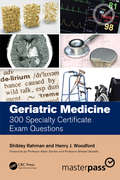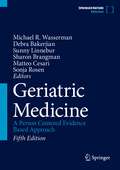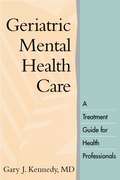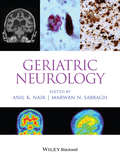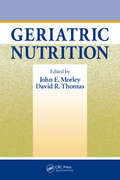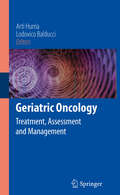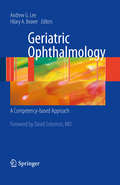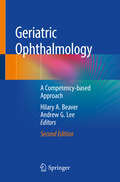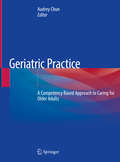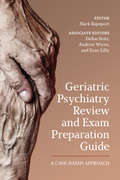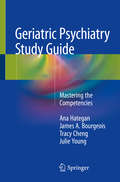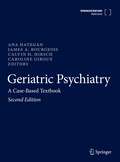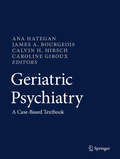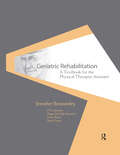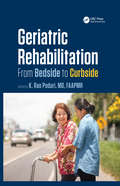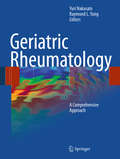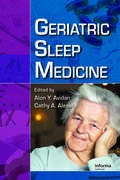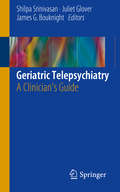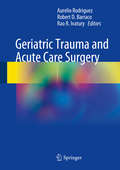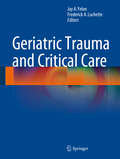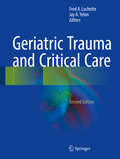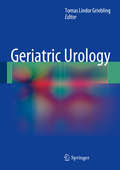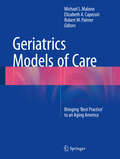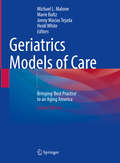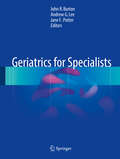- Table View
- List View
Geriatric Medicine: 300 Specialty Certificate Exam Questions (MasterPass)
by Shibley Rahman Henry J. WoodfordThis book is an authoritative and well-structured text which is both topic and curriculum oriented, aimed to appeal to a wider multi-professional audience in line with the current NHS workforce training needs in the UK. It is based on the ‘specialist certificate examination’ (SCE), awarded for the completion of higher specialist training. Following closely the published blueprint from the Royal College of Physicians, and the curriculum from JRCPTB, it provides an up-to-date bank of revision material. These 300 questions in the ‘single best answer’ (SBA) format (like the actual assessment), are complete with comprehensive, well-evidenced explanations and explanatory further reading material. Key Features Maps the entire curriculum covered on the geriatric specialization exam Addresses the gap in the market to educate on the core curriculum for the busy professionals and post graduate medical trainees working towards this examination The book is thematically organized to make it an accessible quick reference for also those not planning to take the exam but seeking to broaden and deepen their own knowledge base
Geriatric Medicine: A Person Centered Evidence Based Approach
by Matteo Cesari Michael R. Wasserman Debra Bakerjian Sunny Linnebur Sharon Brangman Sonja RosenOlder adults represent the most rapidly growing demographic in the U.S. and in many developed countries around the world. The field of geriatric medicine is still relatively young, and is only recently seeing a significant increase in peer reviewed literature. Medicare and Medicaid expenditures related to older adults are nearly a trillion dollars/year in the US. How our healthcare system cares for older adults, and how those older adults navigate an increasingly complex system, is of the utmost importance. According to the Institute of Medicine, physicians and other healthcare professionals receive an inadequate amount of training in geriatric medicine. Geriatric medicine is based on the concept of delivering person centered care with a focus on function and quality of life. It is essential that physicians, nurse practitioners, physician assistants, pharmacists, social workers and other health care professionals all be knowledgeable about the geriatric approach to care.Geriatric medicine varies from most other fields in medicine. While many specialties function on the basis of evidence-based literature, geriatricians and other clinicians caring for older adults must integrate relatively limited evidence with variable physiological changes and complex psychosocial determinants. Geriatricians are used to caring for 90 year olds with multiple chronic illnesses. Their variable physiology leads to uncertain responses to pharmacotherapy, and their personal goals and wishes need to be incorporated into any plan of care. Practicing geriatric medicine requires the ability to see patterns. But it goes one step further, as the rules are constantly in flux. Every patient is an individual with particular needs and goals. In order to provide true person centered care to older adults, one has to incorporate these factors into the decision making process. The proposed handbook is designed to present a comprehensive and state-of the-art update that incorporates existing literature with clinical experience. Basic science and the physiology of aging create a background, but are not the main focus. This is because every chapter has been written through the lens of “person centered care.” This book is about focusing on what matters to the person, and how that is not always about pathology and physiology. The reader generally will not find simple solutions to symptoms, diseases and syndromes. In fact, the key to caring for geriatric patients is the ability to think both critically and divergently at the same time. Geriatrics encompasses multiple disciplines and spans all of the subspecialties. It requires knowledge of working within an interdisciplinary team. It requires an appreciation of how quality of life varies with each individual and creates treatment and care plans that also vary. And most of all, it requires a firm commitment to first learning who the person is so that all of the necessary data can be analyzed and integrated into a true person centered plan of care. This book aims to serve as an unparalleled resource for meeting these challenges. Updated and revised from the previous edition, this text features over 40 new peer-reviewed chapters, new references, and a wide array of useful new tools that are updated on a regular basis by interdisciplinary and interprofessional experts in geriatric medicine.
Geriatric Mental Health Care
by Gary J. KennedyThis essential guide is designed for mental health practitioners and primary care providers without advanced training in geriatric psychiatry. Leading physician and educator Gary J. Kennedy sets forth a clear framework for understanding the interplay of medical, psychological, and social factors in frequently encountered problems among older adults. Clear guidelines are delineated for assessing and treating such conditions as depression and anxiety, dementia, psychosis and mania, sleep disturbances, personality and somatoform disorders, substance abuse, and suicidality. Throughout, Kennedy focuses on ways to sustain seniors' independence and overall quality of life while enhancing their adaptive capacities. Psychopharmacological principles are presented with an emphasis on safety, simplicity, and effectiveness, and the beneficial applications of individual, marital, family, and group psychotherapies are also addressed. Other topics covered include sexuality in old age, problems of elder abuse and neglect, collaborating with family members and other caregivers in medical and nonmedical settings, and legal and ethical issues in treatment.
Geriatric Neurology
by Anil K. Nair Marwan N. SabbaghAging affects neurological function leading to neurological diseaseAs society grows older, so do the neurological problems associated with aging. These can be new neurological deficits due to the aging process itself, or the effect of aging on already existing neurological conditions. Neurologists will spend increasing amounts of time managing patients with age-related neurological complications.Geriatric Neurology brings together the wisdom of world-leading experts. They have crafted a new textbook to define this emerging subspecialty from basic science through clinical assessment and medical management to social aspects of patient care. Geriatric Neurology covers:The aging brain in neurologyAssessment of the geriatric neurology patientNeurological conditions in the elderlyTherapeutics for the geriatric neurology patientManagement issues beyond therapeuticsComprehensive in scope but with practical focus for effective patient care, Geriatric Neurology provides top-of-class guidance for the management of elderly patients with neurological disorders.
Geriatric Nutrition
by John E. Morley David R. ThomasIn a vicious cycle, poor nutritional health leads to acute and chronic disease, and disease states are catastrophic to nutritional health. The magnitude of nutritional depletion from any cause depends to a large extent on the nutritional reserves an individual has accumulated over time. In our increasingly older population, nutritional reserves are
Geriatric Oncology
by Arti Hurria Lodovico BalducciThe management of the older person with cancer is based on the estimate of life expectancy, tolerance of treatment, patient preference, and socio-economic barriers to treatment. The thrust of this book is to make medical oncologists and other health professionals managing older patients with cancer aware of recent developments in geriatric assessment and in cancer management for the older adult. After consulting this text the practitioner will be able to provide individualized treatment to the older cancer patient, reflecting that patient's physiologic age and personal needs. This book will also provide a scaffold to organize rapidly developing advances in geriatric assessment. This is particularly relevant for practitioners of oncology since the majority of patients with cancer are 65 and older. The target audiences for this book are oncologists of all specialties, oncology nurses, primary care physicians, geriatricians, and all other health professionals involved in the management of older patients with cancer.
Geriatric Ophthalmology
by Hilary A. Beaver Andrew G. LeeAs the Baby Boom generation ages, an increased need for geriatric specialty care becomes particularly important. This shift will especially affect ophthalmology, as the occurrence of common visual disorders such as cataracts, macular degeneration, glaucoma and diabetic retinopathy increases with age. This book anticipates this pending and inevitable demographic shift and fulfills the need for a practical, "bread-and-butter" approach to Geriatric Ophthalmology.
Geriatric Ophthalmology: A Competency-based Approach
by Hilary A. Beaver Andrew G. LeeGeriatric patients have unique responses to treatment and disease, often harboring co-morbidities that can impact evaluation, treatment, and prognosis, which can require specialized expertise or experience. Geriatric Ophthalmology, Second Edition draws upon the successful first edition by applying a competency-based approach to these patients, improving awareness, increasing understanding, and encouraging expertise about geriatric issues among eye care professionals. <P><P> These intersecting conditions and their treatment are comprehensively discussed in this fully updated second edition, complete with additional high-quality illustrations and photos. Each chapter utilizes illustrative cases to exemplify the points of care encompassed by the competencies. Topics of special interest are included, such as diabetic retinopathy, age-related macular degeneration, cataracts, glaucoma, diabetic retinopathy, low vision, all diseases of aging, and the effect of vision loss on the geriatric patient’s quality of life. Medical students, residents, fellows, clinicians, and allied health personnel alike will find this to be a comprehensive resource and exceptional guide to the care of older patients with geriatric ophthalmology problems.
Geriatric Practice: A Competency Based Approach to Caring for Older Adults
by Audrey ChunThis book serves as a comprehensive reference for the basic principles of caring for older adults, directly corresponding to the key competencies for medical student and residents. These competencies are covered in 10 sections, each with chapters that target the skills and knowledge necessary for achieving competency. Each of the 45 chapters follow a consistent format for ease of use, beginning with an introduction to the associated competency and concluding with the most salient points for mastery. Chapters also includes brief cases to provide context to the clinical reasoning behind the competency, strengthening the core understanding necessary to physicians of the future. Written by expert educators and clinicians in geriatric medicine, Geriatric Practice is key resource for students in geriatric medicine, family and internal medicine, specialties, hospice and nursing home training, and all clinicians studying to work with aging patients.
Geriatric Psychiatry Review and Exam Preparation Guide: A Case-Based Approach
by Andrew Wiens Dallas Seitz Evan Lilly Mark RapoportGeriatric psychiatry is a relatively young discipline within the field of North American psychiatry. The development of a workforce to meet the needs of an aging population has been identified as an urgent priority, but there is still much we don’t know about fulfilling the mental health needs of older adults. For Mark J. Rapoport, geriatric psychiatrists must assess and treat patients today in face of the limitations of what we know, but also be armed with enthusiasm to create novel ways of impacting on the quality of life of older patients with mental illness. The chapters in this book include case scenarios, concise point-form summaries of diagnostic and treatment approaches, up-to-date evidence syntheses, discussions of controversies, and a series of practical and thought-provoking questions and answers. Geriatric Psychiatry is a succinct and advanced review of geriatric psychiatry that will help clinicians improve the psychiatric care of an aging population.
Geriatric Psychiatry Study Guide: Mastering The Competencies
by James A. Bourgeois Julie Young Ana Hategan Tracy ChengTrainees in subspecialty of geriatric psychiatry and general psychiatry need to master core competencies in geriatric psychiatry in order to practice. This book is designed to provide short-answer question-based learning centering around the core curriculum topics in geriatric psychiatry and is primarily ideal not only for medical students, residents, and fellows, but also for psychiatrists preparing for re-certification. This book features approximately 300 short-answer questions on geriatric psychiatry topics, each comprising the stem of a brief clinical scenario or concise question with expected number of answers. The book also features detailed teaching notes, graphics, and the respective source references. The format is consistently structured from chapter to chapter, practical and concise, and designed to enhance the reader’s diagnostic and management ability and clinical understanding. Each answer includes a concise discussion, pertinent illustrations, and source references. This text is a valuable reference and teaching tool that provides an opportunity for learning across a rapidly growing field. The material covered matches the existing postgraduate curricula in geriatric psychiatry and helps prepare candidates for their specialty and subspecialty certification examinations. The cases map well to both the American Geriatric Psychiatry Association and Canadian Academy of Geriatric Psychiatry as well as other international postgraduate curricula. The book covers main topics within geriatric psychiatry, some such as substance use disorders and sexuality and sexual dysfunction in later life. As the Baby Boomers age, this reference will continue to be a valuable staple in geriatric workforce training. Geriatric Psychiatry Study Guide is the ultimate resource for students, residents, fellows, psychiatrists, psychologists, family practitioners, nurses, social workers, and all clinicians rising to the challenges of the mental health segment of the geriatric workforce.
Geriatric Psychiatry: A Case-Based Textbook
by James A. Bourgeois Ana Hategan Calvin H. Hirsch Caroline GirouxThis textbook presents real-world cases and discussions that introduce the various psychiatric syndromes found in the aging population before delving into the core concepts covered by geriatric psychiatry curricula. The text follows each case study with the vital information necessary for physicians in training, including key features of each disorder and its presentation, practical guidelines for diagnosis and treatment, clinical pearls, and other devices that are essential to trainees in geriatric psychiatry. With the latest DSM-5-TR guidelines and with rich learning tools that include key points, review questions, tables, and illustrations, this text is the only resource that is specifically designed to train both US and Canadian candidates for specialty and subspecialty certification or recertification in geriatric psychiatry. It will also appeal to audiences worldwide as a state-of-the-art resource for practice guidance. The text meets the needs of the future head on with its straightforward coverage of the most frequently encountered challenges, including neuropsychiatric syndromes, psychopharmacology, elder care and the law, substance use disorders, psychiatric comorbidities in systemic medical illness, consultation-liaison psychiatry, palliative care, climate change and health, and equity/diversity/inclusion matters in the care of older adults. Written by experts in the field, Geriatric Psychiatry: A Case-Based Textbook, 2nd edition will be the ultimate resource for graduate and undergraduate medical students and certificate candidates providing mental health care for aging adults, including psychiatrists, psychologists, geriatricians, primary care and family practice doctors, neurologists, social workers, nurses, and others.
Geriatric Psychiatry: A Case-based Textbook
by James A. Bourgeois Ana Hategan Calvin H. Hirsch Caroline GirouxThis textbook presents real-world cases and discussions that introduce the various mental health syndromes found in the aging population before delving into the core concepts covered by geriatric psychiatry curricula. The text follows each case study with the vital information necessary for physicians in training, including key features of each disorder and its presentation, practical guidelines for diagnosis and treatment, clinical pearls, and other devices that are essential to students of geriatric psychiatry. With the latest DSM-5 guidelines and with rich learning tools that include key points, review questions, tables, and illustrations, this text is the only resource that is specifically designed to train both American and Canadian candidates for specialty and subspecialty certification or recertification in geriatric psychiatry. It will also appeal to audiences worldwide as a state-of-the-art resource for credentialing and/or practice guidance. The text meets the needs of the future head on with its straightforward coverage of the most frequently encountered challenges, including neuropsychiatric syndromes, psychopharmacology, eldercare and the law, substance misuse, mental health following a physical condition, medical psychiatry, and palliative care.Written by experts in the field, Geriatric Psychiatry: A Case-Based Textbook is the ultimate resource for graduate and undergraduate medical students and certificate candidates providing mental health care for aging adults, including psychiatrists, psychologists, geriatricians, primary care and family practice doctors, neurologists, social workers, nurses, and others.
Geriatric Rehabilitation: A Textbook for the Physical Therapist Assistant (Core Texts for PTA Education)
by Jennifer BottomleyAs the aging population continues to increase, so does the need for a text specific to the specialized care of the elderly patient as it applies to the physical therapist assistant student, faculty, and clinician. Geriatric Rehabilitation: A Textbook for the Physical Therapist Assistant, recognizes the growing role of the PTA in a variety of heath care settings from acute to home to long-term care settings, to name a few.Inside Geriatric Rehabilitation, Dr. Jennifer Bottomley, along with her contributors, focuses on the clinically relevant assessment, treatment, and management of the geriatric population. Pathological manifestations commonly seen in the elderly patient are addressed from a systems perspective, as well as a focus on what is seen clinically and how it affects function. Each pathological area covered includes: • Screening, assessment, and evaluation • Treatment prescription• Goal setting• Modification of treatment• Anticipated outcomes• Psychosocial, pharmacological, and nutritional elementsThe organization and presentation of the practical, hands-on components of interventions, assessments, and decision-making skills make this a go-to text for the PTA to administer comprehensive geriatric care at each point along the continuum of care.Some of the features inside include:• Emphasis on treatment interventions–techniques, tips, and options• Focus on how assessment tools and treatments are applied and modified to benefit the geriatric population, and what the expected outcomes are• Clear and outlined chapter objectives• User-friendly summary tables in the nutritional and pharmacology chapters• Pearls that highlight important chapter information• Appendices and study aidsGeriatric Rehabilitation: A Textbook for the Physical Therapist Assistant answers the call for a text that focuses on the management of geriatric patients across the spectrum of care for the PTA, from students to those practicing in geriatric populations.
Geriatric Rehabilitation: From Bedside to Curbside (Rehabilitation Science in Practice Series)
by K. Rao PoduriGeriatric Rehabilitation addresses the fact that this is an age in which individuals have increasing longevity, better health care, education and expectations of health care which present new, increasing and even radical challenges to health care providers. The care of our older patients in rehabilitation settings demands the broad understanding of the key differences in strategies to care for older adults. The combined skills embraced in rehabilitation and geriatrics are presenting unprecedented opportunities for both fields to make substantive and even ground-breaking improvements in the lives of millions of older adults who entrust their lives to us. Rarely in one’s medical career are such opportunities so evident and achievable. Geriatric Rehabilitation edited by Dr. K. Rao Poduri, MD. FAAPMR draws on a distinguished group of authors who are the front-line providers of care to the older adults. This book presents the full spectrum of the unique care needs of older patients who need the combined skills of physical medicine and geriatrics. It provides an easily accessible means of acquiring and improving these new skills for all those involved in geriatric care.
Geriatric Rheumatology
by Yuri Nakasato Raymond L. YungThe first book dedicated explicitly to the care of elderly patients with rheumatic diseases, this comprehensive resource is a practical guide for navigating the medical concerns of these complex patients. While patients over 65 years of age comprise roughly 15% of the population, they consume about 50% of rheumatology resources. This book presents current clinical practices with an eye toward achieving economically sustainable models of care. The world's leading authorities have come together to cover the full spectrum of rheumatic diseases, the immune system in aging, and ultrasound evaluation and arthrocentesis. The book also addresses the milieu of co-morbidities that the clinician may encounter with an older patient, as well as the accompanying concerns about multiple pharmacologic therapies and drug interactions. Bringing in experts from a wide array of subspecialties, the editors present the essentials of multidisciplinary care, an approach which is the hallmark of geriatrics and which naturally translates into the field of gerontorheumatology. Designed for primary care physicians and rheumatology consultants, Geriatric Rheumatology is an invaluable guide to caring for this rapidly growing patient population.
Geriatric Sleep Medicine
by Alon Y. Avidan Cathy A. AlessiGeared toward sleep specialists, neurologists, geriatricians, and psychiatrists, Geriatric Sleep Medicine presents the most current medical research for the diagnosis and management of sleep disorders in the older patient. Focused on the prevention of chronic geriatric sleep disorders, this text examines:the most recent and up-to-date classifi
Geriatric Telepsychiatry
by Shilpa Srinivasan Juliet Glover James G. BouknightThis book provides a basic introduction to geriatric telepsychiatry, including potential benefits and drawbacks of utilizing this treatment modality. The text discusses applications in academic, public, federal, and educational settings and suggests practical guidelines for implementing and maintaining a telepsychiatry program. As the elder population continues to grow over the next several decades, digital tools, including videoconferencing, will play a large role in meeting the needs of the elderly. Written by the leaders in geriatric telepsychiatry, this text is the first to focus on the psychiatric application of these digital tools, lay out the policies and guidelines for treating patients who can benefit from this service, and outline the most cutting-edge research on the topic. Geriatric Telepsychiatry is the ultimate guide for psychiatrists, geriatricians, social workers, geriatric nurses, students, long-term care facilitators, and all medical professionals who work with the elderly psychiatric patient.
Geriatric Trauma and Acute Care Surgery
by Rao R. Ivatury Aurelio Rodriguez Robert. D BarracoThe purpose of this book is to give providers of all levels a simple and essential source of practical information in treating the elderly trauma and emergency surgery patient. The Introduction instructs practitioners how to evaluate and assess risk including frailty and use this information in Goals of Care discussions to facilitate shared decision making so crucial to this population.The individual chapters consist of best practices and care guidelines from some of the most well-known thought leaders and best trauma centers in the country across the spectrum from geriatricians to trauma and acute care surgeons and nurses. Each chapter contains easy-to-read algorithms and references that the readers can use and adapt for their own setting. Chapters on Pre-hospital care will help guide EMS organizations and even systems in the right care and triage of the elderly. Each chapter also contains a Nursing Focus section for helpful nursing tips in caring for the elderly with those injuries and problems. These sections make this book a must-have for any center looking to improve its care of the elderly patient or just trying to be sure its care is already the best it can be.A special section on Post Acute Care will introduce the provider to the common issues surrounding particular disposition destinations for the elderly patient. This will facilitate discussions with families, case managers and facilities to help improve time to disposition.
Geriatric Trauma and Critical Care
by Jay A. Yelon Fred A. LuchetteGeriatric Trauma and Critical Care provides a multidisciplinary overview of the assessment and management of the elderly patient presenting with surgical pathology. By utilizing current literature and evidence-based resources, the textbook elucidates the unique nature of caring for the elderly population. The structure of the volume provides the reader with an overview of the physiologic and psychological changes, as well as the impact on the healthcare system, associated with the aging process. Emphasis is placed on the impact of aging, pre-existing medical problems, effects of polypharmacy, advanced directives and end-of-life wishes on acute surgical problems, including trauma and surgical critical care. Special attention is given to the ethical implications of management of the aged. The multidisciplinary contributors provide a unique point of view not common to surgical texts. The textbook is the definitive resource for practicing surgeons, emergency medicine physicians, intensivists, anesthesiologists, hospitalists, geriatricians, as well as surgical residents, nurses and therapists, all who care for elderly patients with surgical emergencies.
Geriatric Trauma and Critical Care
by Jay A. Yelon Fred A. LuchetteWith the expertise of an author panel of leading clinicians in the field of surgery, trauma, critical care and geriatrics the new edition of this text addresses the explosion in knowledge on the impact aging has on injury, acute illness and critical care management. The text covers the physiologic changes associated with aging, as well as the clinical assessment, stratification, and management of acute illness and injury. Furthermore, the new edition discusses the full spectrum of critical care management of the elderly. Part I explores the impact of aging on health and the healthcare system. There will be detailed discussion on the physiologic effects of aging and the impact on clinical management. The management of common surgical emergencies in the elderly is addressed in Part II. Part III addresses the evaluation and management of trauma and injury. Finally, Part IV explores the specific challenges of critical care management, including end-of-life and ethics, in the geriatric population. Updated information, reflective of the expansive literature, is addressed in all sections. New to the second edition are chapters on prehospital care, burns, nursing concerns, and abdominal solid organ injury. Appropriate chapters will include case vignettes and clinical algorithms. All chapters include a bullet-point summary. Geriatric Trauma and Critical Care, 2nd Edition will be of great value to trauma surgeons, acute care surgeons, critical care specialists, emergency medicine physicians, geriatricians, general surgeons, and trainees in surgery, critical care, and emergency medicine. Advanced practice nurses, critical care nurses, and physician assistants will also find this a useful and practical resource.
Geriatric Urology
by Tomas Lindor GrieblingGeriatric Urology outlines important topics in the care of elderly urology patients. The first section covers the biology of aging, the genitourinary system and disease screening including urologic conditions serving as warning signs of other disorders. Section two covers geriatric syndromes and urology including frailty, polypharmacy, dementia, wound healing, osteoporosis and endocrinology. Urologic conditions in older adults are explored in detail including urinary incontinence, pelvic organ prolapse, urinary tract infection, nocturia, and benign prostate diseases. Other topics covered include obtaining informed consent, development of advance directives, palliative medicine and care of the dying patient. Geriatric Urology is of great value to urologists, geriatricians, internists, residents and family practitioners.
Geriatrics Models of Care
by Michael L. Malone Elizabeth A. Capezuti Robert M. PalmerThis book describes geriatrics practice models that are used to guide the care of older adults, allowing seniors to remain at home, prevent functional disability and preserve quality of life. The models include specific interventions which are performed by health care workers to address the needs of older persons and their caregivers. These models respect patient values, consider patient safety and appreciate psychosocial needs as well. Divided into six parts that discuss hospital-based models of care, transitions from hospital to home, outpatient-based models of care and emergency department models of care, this text addresses the needs of vulnerable patients and the community. Geriatric Models of Care is an excellent resource for health care leaders who must translate these programs to address the needs of the patients in their communities.
Geriatrics Models of Care: Bringing 'Best Practice' to an Aging America
by Heidi White Marie Boltz Michael L. Malone Jonny Macias TejadaFollowing the success of the previous edition, the second edition of Geriatrics Models of Care is the definitive resource for systems-based practice improvement for the care of older adults. Several new models of care have been published in the last eight years, new outcomes have emerged to better understand the impact of existing models, and with the rise of the Age-Friendly Health Systems movement, promoting organized efforts to prepare our health care settings for older individuals is of more importance than ever. The second edition is organized based on the practice setting along a continuum of care: hospital, transitions from hospital to home, outpatient settings, and the emergency department. This book also highlights long-term care models, which is an important part of the continuum of care for older Americans. Further, this edition features models that address the needs of vulnerable populations. This new section will describe a spectrum of programs for older adults who have Alzheimer’s disease or Parkinson’s disease. Other models describe best practices for older adults undergoing surgery or those who want to remain functioning independently in their home. A defining feature of this book is that each chapter follows a standard template: 1) the challenge which led to the model; 2) the patient population served; 3) core components of the intervention; 4) the role of interdisciplinary health professionals; 5) evidence to support the intervention; 6) lessons learned in the implementation and dissemination of the model; 7) implications for family caregivers, and communities (particularly underserved and diverse communities); and 8) how each model will provide care across the continuum during an entire episode of care. In addition, each chapter features a “call out” box with practical tips for implementing the model.
Geriatrics for Specialists
by Andrew G. Lee John R. Burton Jane F. PotterThis book focuses on the circumstances that lead to the marked increasedvulnerability of seniors and are most challenging to clinicians including thepresence of multiple chronic medical conditions, variable losses ofphysiological function, and heterogeneity among individuals. Written bythe experts who lead the initiative to deliver high quality surgical andmedical care to the elderly, Geriatricsfor Specialists is the first book of its kind to provide the comprehensive knowledgespecialists and associated generalists need to deliver quality health care toseniors. With topics on important cross cutting issues like frailty,delirium and polypharmacy and specialty chapters on emergency medicine,anesthesia, many surgical and medical disciplines and rehabilitation, this book provides clinicians the knowledge and tools needed to evaluate,treat and manage the unique needs of seniors. Geriatrics for Specialists was created as a resource for specialist, generalists and allied healthprofessionals and their students and trainees who care for elderly patients.
